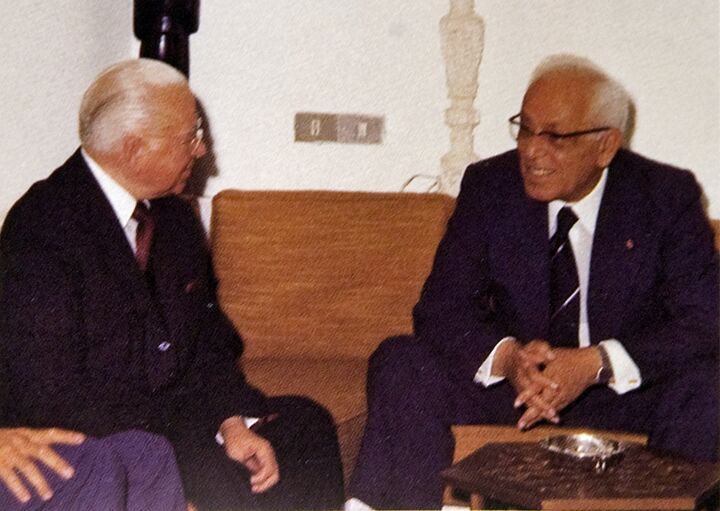
Lebanon’s President Frangieh Welcomed Herbert W. Armstrong and God’s Gospel
Why did President Suleiman Frangieh of Lebanon invite Herbert W. Armstrong to his home for personal discussions and to meet his family?
Why did Lebanon’s Prime Minister Takieddin el-Solh receive a private Bible study from him?
Why did other elite of Lebanon join in seeking out this unofficial ambassador for world peace? What message did they want to receive?
“We were welcomed at Beirut airport in vip manner,” Mr. Armstrong wrote Church members and co-workers Sept. 24, 1973, on the occasion of his visit to Lebanon. He would spend the entire week in that Middle Eastern country.
“Our meeting with the president and first lady was on Friday at the summer Presidential Palace, high in the mountains, and a two-hour automobile drive from Beirut,” Mr. Armstrong wrote.
The president ensured his whole day was devoted to this meeting. Arriving in the morning, Mr. Armstrong took 60 minutes to outline the purpose of the work in which he was engaged, explaining the basics of the spiritual doctrines of the Church and wrapping up with a review of the Ambassador College annual publication, the Envoy.
The luncheon, planned by Lebanon’s first lady, included visits from the president’s sons and grandsons, along with various photo opportunities.
Throughout that week all additional meetings with top officials of Lebanon were concluded successfully. They culminated, Mr. Armstrong recalled, with a meeting with Edmond Rizk, minister of education, remarking, “Your presence here, Mr. Armstrong, is evidence of the presence of God.”
The visit with Takieddin el-Solh, the prime minister, took place on the Sabbath, due to his returning the night before from the Conference of Non-Aligned nations. “But, my visit with him was really to go into phases of the gospel, and for an hour and ten minutes, we were remarkably in accord in regard to principles and philosophies.”
In response to this in-person Bible study atmosphere, the prime minister told this ambassador for peace, “Your appearance and physical presence denote your character and the nature of your activities. Great men accomplishing important things bear their age well.”
That night, before his departure, a special reception was held in Mr. Armstrong’s honor on the second-story patio of a large corporate building that overlooked the lights of Beirut. For dinner Dr. and Mrs. Charles Malik sat with him. Dr. Malik was a former president of the UN General Assembly. At the time of this meeting he was a member of the Lebanese cabinet and legislature.
Forty years after reporting for the Plain Truth and the World Tomorrow radio program from San Francisco while attending the signing of the United Nations charter, Mr. Armstrong and Dr. Malik would reunite in June 1985 as honored guests at the 40th anniversary conference of the UN, again in San Francisco. Once more, Mr. Armstrong would report on the event for the Plain Truth. He also was filmed in an exclusive interview with Dr. Malik for the World Tomorrow television program.
Mr. Armstrong’s visit to Lebanon to preach the gospel directly to its president, at his invitation, was seen as highly significant to this friend of so many of the world’s leaders at that time. Referring to the message he shared with them, Mr. Armstrong said, “[I]t is new and does not offend Muslims. The world has its religions. I do not go to them with another or competing ‘religion.’ But with new revealed truth from God and Creator of the Arab people and all people! And they are listening! And interested!”
Mr. Armstrong referred to the beautiful cedars of Lebanon in such written works as his autobiography, also his book The Incredible Human Potential and his final publication, the culmination of his life’s work, Mystery of the Ages.
He recalled the cedars’ prophesied felling, as recorded in Isaiah 14:8, and viewed a “small clump” that remained, which he personally photographed, when visiting the country.
Additionally, he recalled what he thought were the finest specimens of those cedars of Lebanon, located on the then Ambassador College campus in Bricketwood, England.
In this tradition, beautiful young cedars also grace the picturesque campus of Herbert W. Armstrong College in Edmond, Oklahoma.
“Lebanon was known for its beautiful cedars and fir trees. But that was anciently. God prophesied a big change,” wrote Gerald Flurry in his inspirational booklet Isaiah’s End-Time Vision.
“Is it not yet a very little while, and Lebanon shall be turned into a fruitful field, and the fruitful field shall be esteemed as a forest? And in that day shall the deaf hear the words of the book, and the eyes of the blind shall see out of obscurity, and out of darkness” (Isaiah 29:17-18).
“God knew that Lebanon today would be one of the worst botches on this Earth! That is probably why He prophesied specifically about Lebanon. God wanted the world to contrast the squalor of today with the glory of the World Tomorrow!” (ibid).
That glory is not apparent in the Lebanon of today, as it writhes amid regional tensions preceding the prophesied toppling of its current pro-radical Islamic overseer, Syria (Psalm 83).
Out of the darkness of its present-day suffering will soon dawn the light of lasting peace and prosperity for Lebanon.
Mr. Flurry’s inspirational words from the above-mentioned booklet ought to glow in the heart of all Lebanese citizens: “Men and women will get down on their knees and plant roses—they will make this Earth beautiful. Mankind will see what they can accomplish when their energy has a godly focus.”
This is the hope-filled message so warmly received by Lebanon’s leaders when delivered by Mr. Armstrong. And this is the same hope-filled message continued today by the Trumpet’s publisher and founder.
Now that is a future worth looking forward to!
